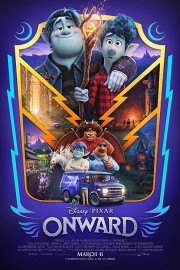Onward
When Pixar nails an ending, there are few filmmakers more confident in their ability to wring emotion out of a story. Their fantasy adventure film, “Onward,” is the latest example, and even if it feels slight through most of it, that ending will get you.
The evolution of Pixar in the past decade, which has focused more on sequels than original films, is one of the most fascinating transitions in modern cinema. I really enjoy a great deal of those sequels- the “Toy Story” films, “Monsters University,” “Incredibles 2” and even “Cars 3” had some solid continuations of their stories- but “Brave,” “Inside Out” and “Coco” were, hands down, peak Pixar, and it’s been good to hear that they are looking to get back to original stories again. “Onward” isn’t upper tier Pixar, but it’s a solid reintroduction to that mindset.
“Onward” begins with a history lesson on the history of magic in the film’s world, and the encroachment of technological advances like the light bulb. Eventually, the city of New Mushroomton looks like the modern world, even if there are unicorns fighting over turned over trash cans, elves living in houses and centaurs working as police officers. In this city lives Ian Lightfoot (Tom Holland), his older brother Barley (Chris Pratt) and their mother, Laurel (Julia Louis-Dreyfus). Ian is turning 16, and he’s as awkward a teen as you can imagine, whereas Barley seems to be a mess-up, and obsessed with the magical history of their world. That night, Laurel gives the boys a present their deceased father wanted them to have when they were both at least 16- his magical staff, a rare gem stone, and a letter outlining a spell that would allow them to spend one day with their resurrected father. They do the spell, but only half of their father is conjured- the bottom half. The gem is used up, though; to get the rest of him, they’ll have to go on a quest to find another stone. Time for adventure.
Anytime you are dealing with the emotional bonds between the main characters and someone they’ve lost, you’re going to have to nail the feelings of the story. The comedy and adventure is one thing, and co-writer/director Dan Scanlon (who did the underrated “Monsters University”) does a serviceable job with that part, especially in building a world where fantasy and modern ideas coexist. When it comes to the emotional part, that’s where “Onward” really scores. It begins as a story about two sons who look at this as a chance to spend some time with the father they didn’t really know, but along the way, the emotional center changes, and becomes something very different. Much like the last two “Toy Story” films, what we think of as the film’s narrative thrust between the brothers turns into about how one of them really needs this for one reason, and the other needs it for another reason. Once that snaps into focus, the film is a stone-cold winner in the Pixar tradition, as well as a glimpse of the original imagination we haven’t really seen from Pixar since, maybe, “Monsters Inc.”. It’s good to have it back, and I’m looking forward to seeing there it leads them next.










